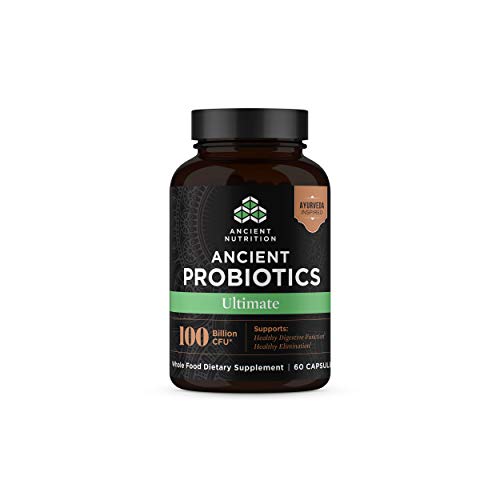
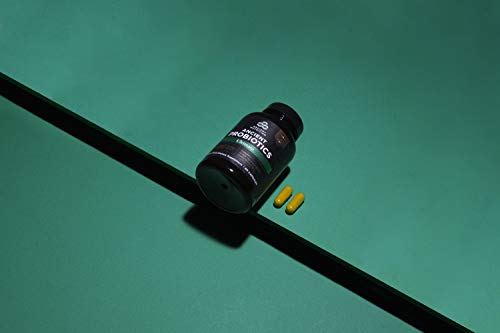
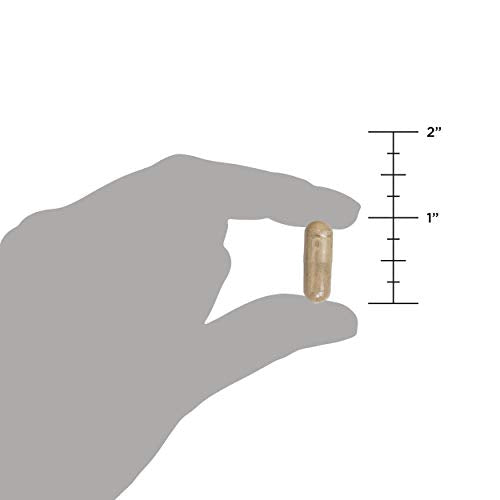
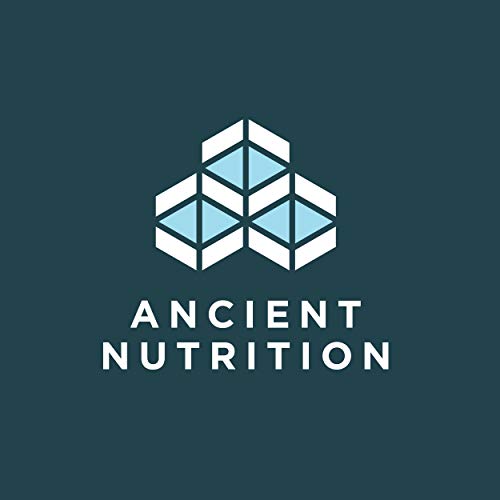
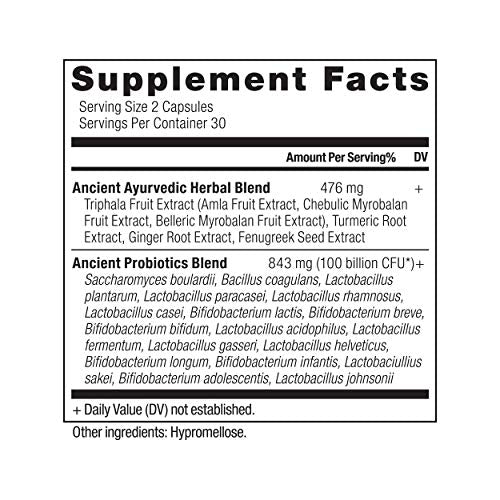
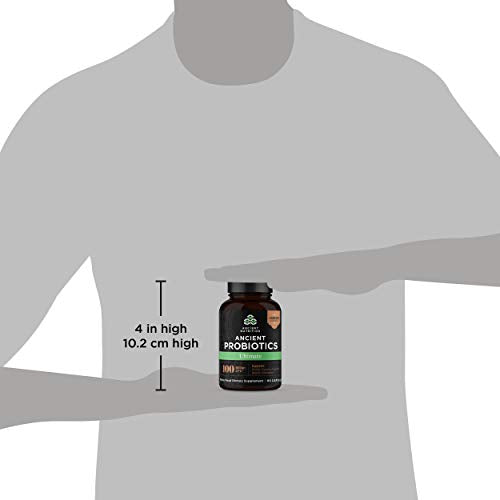
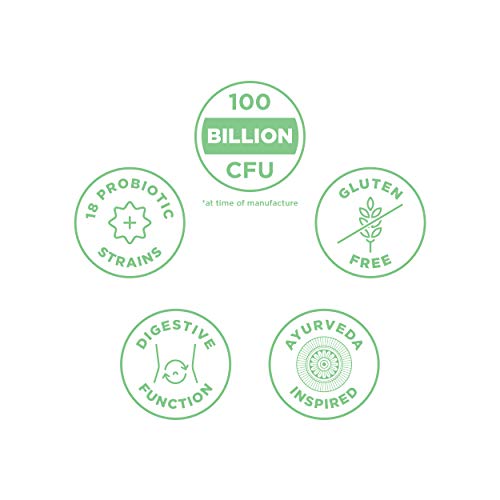
Ancient Nutrition Probiotic - 100 Billion CFUs for Digestive & Immune Support - 60 Capsules


Hydroxymethylcellulose
Low RiskHydroxymethylcellulose is a synthetic polymer derived from cellulose, primarily used as a thickening agent, emulsifier, and film-forming agent in various personal care and cosmetic products. It enhances texture, stability, and moisture retention, making it suitable for use in creams, lotions, and gels.
Sustai Insights
Hydroxymethylcellulose serves effectively as a thickener and stabilizer, contributing to product texture and moisture retention. It is considered low risk for health concerns such as carcinogenicity, allergies, and reproductive toxicity. Environmentally, it is not classified as a pollutant or bioaccumulative, aligning with regulatory standards in multiple regions. Overall, its risk level is assessed as low, with no significant adverse effects reported. Safe usage practices should be followed, and while alternatives exist, hydroxymethylcellulose remains a suitable choice in formulations.
Bifidobacterium Longum
Low RiskBifidobacterium longum is a type of beneficial bacteria commonly found in the human gut. It plays a key role in maintaining gut health, supporting digestion, and enhancing the immune response. Its primary function in products is often as a probiotic ingredient, promoting a balanced microbiome.
Sustai Insights
Bifidobacterium longum offers functional benefits as a probiotic, contributing to digestive health and immune support. It is considered low risk for health concerns such as carcinogenicity, allergies, or reproductive toxicity. Environmentally, it poses minimal risks, with no significant pollutant or bioaccumulation potential. Regulatory bodies do not impose restrictions on its use, indicating a favorable status. Overall, this ingredient can be safely used in products, making it a low-risk option for consumers.
Zingiber Officinale (Ginger) Root Extract
Low RiskZingiber officinale (ginger) root extract is derived from the ginger plant, widely recognized for its use in culinary applications and traditional medicine. It serves various functions in products, including flavor enhancement and potential therapeutic benefits due to its bioactive compounds.
Sustai Insights
Ginger root extract offers functional benefits such as flavoring and possible anti-inflammatory properties. It is sustainably sourced and biodegradable. Health risks are low, with minimal concerns regarding carcinogenicity, allergies, or reproductive toxicity. Environmental risks appear low, with no significant pollutants. Regulatory status is favorable, with no major warnings. Overall, the risk level associated with ginger root extract is low, making it a suitable ingredient in various applications.
Lactobacillus Rhamnosus
Low RiskLactobacillus rhamnosus is a type of beneficial bacteria commonly found in fermented foods and probiotics. It is predominantly used for its probiotic properties, supporting gut health and contributing to the balance of intestinal microflora in various health products.
Sustai Insights
Lactobacillus rhamnosus offers functional benefits as a probiotic, promoting digestive health and potentially enhancing immune function. It is considered safe with low concerns for carcinogenicity, allergies, and reproductive toxicity. Regulatory bodies have not imposed restrictions on its use. While not known for environmental hazards, further research on its ecological impact is warranted. Overall, it poses a low risk, and safe usage practices include adhering to recommended dosages. Alternatives include other probiotic strains like Lactobacillus acidophilus.
Lactobacillus Casei
Low RiskLactobacillus casei is a type of probiotic bacteria commonly found in fermented foods and dietary supplements. It is primarily used to promote gut health and support the immune system by maintaining a balanced microbiota in the gastrointestinal tract.
Sustai Insights
Lactobacillus casei offers functional benefits as a probiotic, enhancing digestive health and potentially improving immune responses. It is generally regarded as safe, with low concerns regarding carcinogenicity, allergies, or reproductive toxicity. Environmental risks are minimal, and it is not subject to specific regulatory restrictions. Overall, it is assessed as low risk, and safe usage is suggested, although alternatives like Lactobacillus acidophilus may be considered for similar benefits.
Lactobacillus Acidophilus
Low RiskLactobacillus acidophilus is a probiotic bacterium commonly found in the human gut and fermented foods. It plays a key role in digestion and gut health, often used in dietary supplements and functional foods to promote beneficial gut flora.
Sustai Insights
Lactobacillus acidophilus offers functional benefits by supporting digestive health and balancing intestinal microbiota. It is generally recognized as safe with low health risks, including negligible concerns for cancer, allergies, and reproductive toxicity. Environmentally, it poses minimal risk. Regulatory bodies do not impose restrictions on its use. Overall, it holds a low risk profile, making it a favorable ingredient in health products.
Lactobacillus Plantarum
Low RiskLactobacillus plantarum is a type of beneficial bacteria commonly found in fermented foods. It functions primarily as a probiotic, promoting gut health by maintaining a balanced microbiome and supporting digestion. This ingredient is often included in dietary supplements and functional foods for its health benefits.
Sustai Insights
Lactobacillus plantarum provides functional benefits as a probiotic, contributing to digestive health and gut flora balance. It is not associated with significant health risks, as concerns related to carcinogenicity, allergies, and reproductive toxicity are low. Environmentally, it poses minimal risks. Regulatory bodies have not issued any warnings or restrictions for its use, indicating a low overall risk. Safe usage practices include following recommended dosages, and alternatives like other probiotic strains may be considered. Overall, this ingredient is assessed as low risk.
Curcuma Longa (Turmeric) Root Extract
Low RiskCurcuma longa (turmeric) root extract is an extract from the turmeric plant, commonly used for its coloring and potential health benefits in various products. It is recognized for its active compound, curcumin, which is studied for its anti-inflammatory and antioxidant properties.
Sustai Insights
Curcuma longa (turmeric) root extract is valued for its functional benefits, including potential anti-inflammatory and antioxidant effects, contributing positively to formulations. It is biodegradable and often sustainably sourced. Health risks are low, with no significant concerns regarding carcinogenicity or irritation. Environmental risks are minimal, with no evidence of bioaccumulation. Regulatory bodies have not placed restrictions on its use, supporting a low-risk assessment overall. Safe usage practices should be adhered to, but there are few concerns for sensitive populations. Alternatives like ginger extract may provide similar benefits.
Hydroxymethylcellulose
Low RiskHydroxymethylcellulose is a synthetic polymer derived from cellulose, primarily used as a thickening agent, emulsifier, and film-forming agent in various personal care and cosmetic products. It enhances texture, stability, and moisture retention, making it suitable for use in creams, lotions, and gels.
Sustai Insights
Hydroxymethylcellulose serves effectively as a thickener and stabilizer, contributing to product texture and moisture retention. It is considered low risk for health concerns such as carcinogenicity, allergies, and reproductive toxicity. Environmentally, it is not classified as a pollutant or bioaccumulative, aligning with regulatory standards in multiple regions. Overall, its risk level is assessed as low, with no significant adverse effects reported. Safe usage practices should be followed, and while alternatives exist, hydroxymethylcellulose remains a suitable choice in formulations.
Bifidobacterium Longum
Low RiskBifidobacterium longum is a type of beneficial bacteria commonly found in the human gut. It plays a key role in maintaining gut health, supporting digestion, and enhancing the immune response. Its primary function in products is often as a probiotic ingredient, promoting a balanced microbiome.
Sustai Insights
Bifidobacterium longum offers functional benefits as a probiotic, contributing to digestive health and immune support. It is considered low risk for health concerns such as carcinogenicity, allergies, or reproductive toxicity. Environmentally, it poses minimal risks, with no significant pollutant or bioaccumulation potential. Regulatory bodies do not impose restrictions on its use, indicating a favorable status. Overall, this ingredient can be safely used in products, making it a low-risk option for consumers.
Zingiber Officinale (Ginger) Root Extract
Low RiskZingiber officinale (ginger) root extract is derived from the ginger plant, widely recognized for its use in culinary applications and traditional medicine. It serves various functions in products, including flavor enhancement and potential therapeutic benefits due to its bioactive compounds.
Sustai Insights
Ginger root extract offers functional benefits such as flavoring and possible anti-inflammatory properties. It is sustainably sourced and biodegradable. Health risks are low, with minimal concerns regarding carcinogenicity, allergies, or reproductive toxicity. Environmental risks appear low, with no significant pollutants. Regulatory status is favorable, with no major warnings. Overall, the risk level associated with ginger root extract is low, making it a suitable ingredient in various applications.
Lactobacillus Rhamnosus
Low RiskLactobacillus rhamnosus is a type of beneficial bacteria commonly found in fermented foods and probiotics. It is predominantly used for its probiotic properties, supporting gut health and contributing to the balance of intestinal microflora in various health products.
Sustai Insights
Lactobacillus rhamnosus offers functional benefits as a probiotic, promoting digestive health and potentially enhancing immune function. It is considered safe with low concerns for carcinogenicity, allergies, and reproductive toxicity. Regulatory bodies have not imposed restrictions on its use. While not known for environmental hazards, further research on its ecological impact is warranted. Overall, it poses a low risk, and safe usage practices include adhering to recommended dosages. Alternatives include other probiotic strains like Lactobacillus acidophilus.
Lactobacillus Casei
Low RiskLactobacillus casei is a type of probiotic bacteria commonly found in fermented foods and dietary supplements. It is primarily used to promote gut health and support the immune system by maintaining a balanced microbiota in the gastrointestinal tract.
Sustai Insights
Lactobacillus casei offers functional benefits as a probiotic, enhancing digestive health and potentially improving immune responses. It is generally regarded as safe, with low concerns regarding carcinogenicity, allergies, or reproductive toxicity. Environmental risks are minimal, and it is not subject to specific regulatory restrictions. Overall, it is assessed as low risk, and safe usage is suggested, although alternatives like Lactobacillus acidophilus may be considered for similar benefits.
Lactobacillus Acidophilus
Low RiskLactobacillus acidophilus is a probiotic bacterium commonly found in the human gut and fermented foods. It plays a key role in digestion and gut health, often used in dietary supplements and functional foods to promote beneficial gut flora.
Sustai Insights
Lactobacillus acidophilus offers functional benefits by supporting digestive health and balancing intestinal microbiota. It is generally recognized as safe with low health risks, including negligible concerns for cancer, allergies, and reproductive toxicity. Environmentally, it poses minimal risk. Regulatory bodies do not impose restrictions on its use. Overall, it holds a low risk profile, making it a favorable ingredient in health products.
Lactobacillus Plantarum
Low RiskLactobacillus plantarum is a type of beneficial bacteria commonly found in fermented foods. It functions primarily as a probiotic, promoting gut health by maintaining a balanced microbiome and supporting digestion. This ingredient is often included in dietary supplements and functional foods for its health benefits.
Sustai Insights
Lactobacillus plantarum provides functional benefits as a probiotic, contributing to digestive health and gut flora balance. It is not associated with significant health risks, as concerns related to carcinogenicity, allergies, and reproductive toxicity are low. Environmentally, it poses minimal risks. Regulatory bodies have not issued any warnings or restrictions for its use, indicating a low overall risk. Safe usage practices include following recommended dosages, and alternatives like other probiotic strains may be considered. Overall, this ingredient is assessed as low risk.
Curcuma Longa (Turmeric) Root Extract
Low RiskCurcuma longa (turmeric) root extract is an extract from the turmeric plant, commonly used for its coloring and potential health benefits in various products. It is recognized for its active compound, curcumin, which is studied for its anti-inflammatory and antioxidant properties.
Sustai Insights
Curcuma longa (turmeric) root extract is valued for its functional benefits, including potential anti-inflammatory and antioxidant effects, contributing positively to formulations. It is biodegradable and often sustainably sourced. Health risks are low, with no significant concerns regarding carcinogenicity or irritation. Environmental risks are minimal, with no evidence of bioaccumulation. Regulatory bodies have not placed restrictions on its use, supporting a low-risk assessment overall. Safe usage practices should be adhered to, but there are few concerns for sensitive populations. Alternatives like ginger extract may provide similar benefits.
Discover Ancient Nutrition's Probiotics Ultimate, formulated to enhance gut health with 100 billion CFUs of 18 carefully selected probiotic strains. This gluten-free supplement nourishes good bacteria and supports digestion and immune function.
- Gut Health Support: Each capsule delivers 100 billion CFUs to promote a balanced gut microbiome, essential for overall well-being.
- Ancient Superfoods Blend: Enriched with traditional ingredients like Turmeric and Ginger, known for their health benefits, enhancing the efficacy of probiotics.
- Gluten-Free & Allergen-Friendly: Free from gluten and soy, making it a safe choice for those with dietary restrictions.
- Sustainable Practices: Manufactured with a commitment to environmental responsibility, ensuring ethical sourcing of ingredients.
- Customer Satisfaction Guaranteed: Backed by Ancient Nutrition’s promise, providing a hassle-free refund within 60 days if not satisfied.
Experience the power of probiotics with Ancient Nutrition, where health meets tradition.
Subscribe & Save with Sustai
- Best Price Guarantee: Always enjoy the lowest prices on sustainable home essentials.
- No Surprises: We’ll notify you before shipping. No hidden fees, ever.
- You’re in Charge: Change, pause, or cancel your subscription anytime with ease.
- Eco-Friendly Deliveries: Our grouped shipments mean less packaging and lower emissions.
Join us on a sustainable journey. Special offers for a limited time! Prices and promotions may change.
Recommended Products
Discover Ancient Nutrition's Probiotics Ultimate, formulated to enhance gut health with 100 billion CFUs of 18 carefully selected probiotic strains. This gluten-free supplement nourishes good bacteria and supports digestion and immune function.
- Gut Health Support: Each capsule delivers 100 billion CFUs to promote a balanced gut microbiome, essential for overall well-being.
- Ancient Superfoods Blend: Enriched with traditional ingredients like Turmeric and Ginger, known for their health benefits, enhancing the efficacy of probiotics.
- Gluten-Free & Allergen-Friendly: Free from gluten and soy, making it a safe choice for those with dietary restrictions.
- Sustainable Practices: Manufactured with a commitment to environmental responsibility, ensuring ethical sourcing of ingredients.
- Customer Satisfaction Guaranteed: Backed by Ancient Nutrition’s promise, providing a hassle-free refund within 60 days if not satisfied.
Experience the power of probiotics with Ancient Nutrition, where health meets tradition.

You can have at most 2 Sustainable Steals products in your cart
Customer Reviews
Customers’ View
Customers appreciate the effectiveness and health benefits of this probiotic supplement, noting improvements in digestive health and energy levels. Many reviews highlight how the product effectively reduces stomachaches and promotes regularity, with users expressing satisfaction in its ease of use and reliable performance. For instance, one customer noted, "It doesn’t upset my stomach and keeps me regular." However, opinions on its value for money vary, with some finding it a bit pricey but still worth the investment for its quality. Additionally, the gluten-free formulation aligns with the preferences of health-conscious consumers seeking safe dietary options. Overall, customers find this product beneficial for gut health and a supportive addition to their wellness routines.
AI-generated from the text of customer reviewsThis product is rated 5.0 of 5.0 stars.
It has received 1 review.




